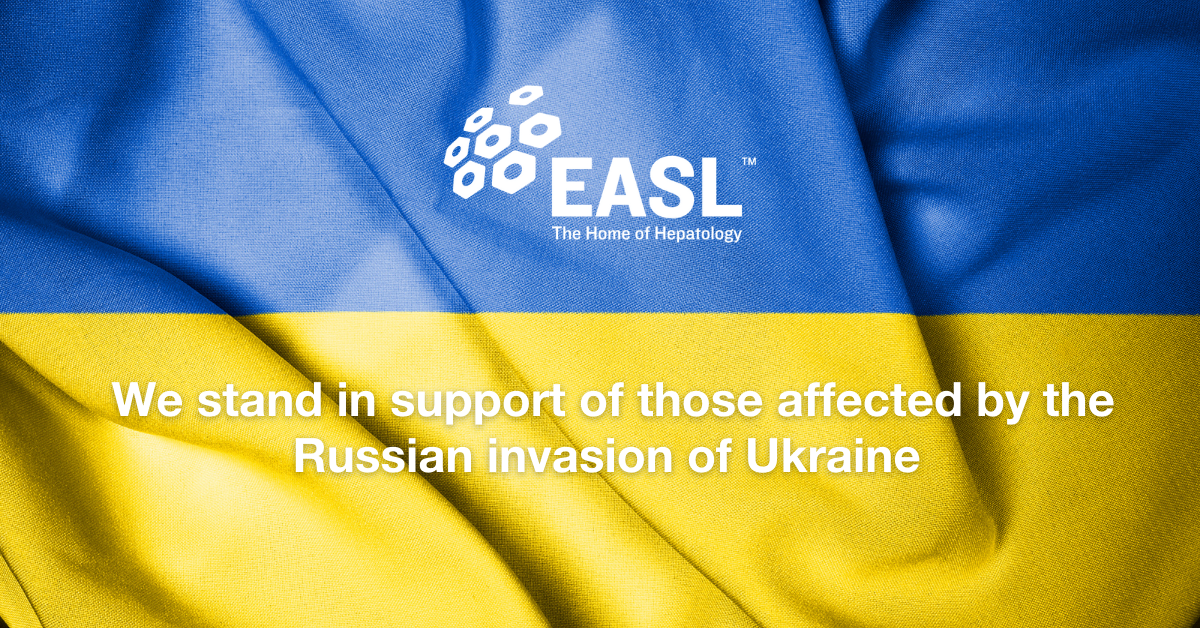Statement of solidarity and support to those affected by the Russian invasion of Ukraine

We, the EASL Governing Board, thus call on our fellow medical associations to join us in strongly condemning the invasion of Ukraine by the Russian Federation, carried out under the orders of Vladimir Putin. We wish to express our deepest sympathy to those affected, to Ukraine and its citizens, especially our Ukrainian members and colleagues. Read our full statement of support below and bookmark this page for updates.
We welcome insights and feedback from those directly affected by the conflict in Ukraine and in neighbouring countries. Please contact us on easloffice@easloffice.eu with your suggestions.
Update: 4 May 2022
EASL is deeply concerned about the situation in Ukraine. To this end, we have published a joint statement, together with the World Health Organization Regional Office for Europe, and the European Centre for Disease Prevention and Control (ECDC): EASL, WHO, and ECDC Joint statement: Ensuring high-quality viral hepatitis care for refugees from Ukraine.
The statement focuses on vulnerabilities associated with viral hepatitis of refugees from Ukraine and providing suggestions for responses to the needs of this group. The measures described in the statement should be integrated into general health measures provided in support of refugees.
Access this statement published initially in English and then translated into Czech, Hungarian, Polish, Romanian, Slovakian, and Ukrainian.
Update: 29 March 2022
In addition to to our statement of support, below, EASL is undertaking the following:
- EASL has reached out to the respective liver and/or gastroenterology associations in Ukraine’s neighbouring countries (Hungary, Moldova, Poland, Romania, and Slovakia), to enquire if EASL can provide any support to these national societies while they manage a large influx of refugees.
- EASL will collaborate with national societies and institutes around Europe who aim to create grant opportunities to host Ukrainian liver specialists and researchers to continue their scientific projects.
- EASL encourages all national societies, institutes, and consortia around Europe to temporarily halt any ongoing scientific collaborations with Russian institutes.
- EASL will provide clinicians and researchers from Ukraine with access to all our educational resources. Such access includes digital access to ILC 2022 and the following annual congress in 2023, access to other EASL-organised events, and two years of complimentary EASL membership. Abstract submission fees will be waived for ILC 2022 and ILC 2023.
- EASL will collaborate with the World Health Organization by collecting information on cancer centres and other hospitals outside Ukraine that have the capacity to assist Ukrainian cancer patients. EASL invites our community to communicate such information directly to eurocancer@who.int.
- EASL will collaborate with national organisations to collect and make known those hepatology clinics and medical centres that are welcoming people with liver diseases.
- EASL will provide links to reputable information for patients, healthcare providers, and emergency services assisting people with liver disease.
- EASL encourages the liver community to make donations to one of the following organisations:
- The UN Refugee Agency (UNHCR)
- The International Committee of the Red Cross (ICRC)
- Doctors Without Borders
EASL's statement of solidarity made 28 February 2022
EASL is committed to promoting research, sharing, and communication among professionals, across Europe and beyond, interested in the liver and its disorders. Our mission is founded on democracy, cooperation, and sharing healthcare expertise for the greater good. Our network of healthcare professionals and their patients extends right across Europe and beyond.
We, the EASL Governing Board, thus call on our fellow medical associations to join us in strongly condemning the invasion of Ukraine by the Russian Federation, carried out under the orders of Vladimir Putin. We wish to express our deepest sympathy to those affected, to Ukraine and its citizens, especially our Ukrainian members and colleagues.
We call on the European Union, the United Nations, WHO Europe and other UN agencies, humanitarian organisations, and the international community at large to protect all victims of this conflict, particularly those living with liver diseases. We further ask for a swift delivery of humanitarian aid assistance for all civilians, notably so that so people with liver diseases can access the care and treatment they urgently need.
We urgently call for peace to protect civilians and prevent further harm.

